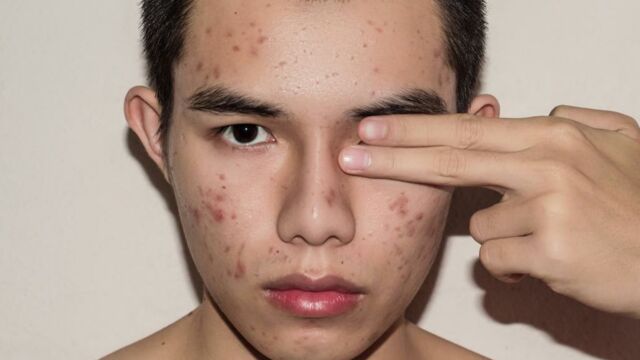Acne isn’t nice. It can be painful, irritating and leaves you feeling insecure. For some, acne starts at puberty; for others, it comes later in life. But, no matter when your acne battle starts or how severe it may be, treating it is always complicated.
Discover our latest podcast
These painful bumps prompt you to either slather your faces with expensive and overhyped products or carve out a DIY approach that, more often than not, leaves your skin more damaged than before.
Whether you suffer from the occasional spot or full-on cystic acne,treating your acne starts with understanding it. So, what is acne and what causes it?
What is acne?
Acne is a skin condition; actually, it is the most common skin condition and is the term for the inflammation and pimples that arise due to a combination of oil and bacteria.
Acne can occur anywhere on the body, but most often, it appears on the face and upper body. This is most likely due to several factors, the most important of which is that there are far more and larger sebaceous glands on the upper body and scalp compared to the rest of the body. This increased amount of sebaceous glands ultimately results in higher levels of sebum production in these areas. Sebum works to protect the skin from the elements, but it also is a breeding ground for acne bacteria.
When there is an overproduction of sebum, your pores can become clogged by this oil. Your skin’s oil isn’t the only contributor to acne though, as skin cells can also lead to the blocking of pores. Together, these factors cause an overgrowth in p.acnes - now known as c.acnes - bacteria, leading to an inflammatory reaction in the skin. And voila! Now you have a pimple - or many pimples.
It doesn’t just stop there; acne pimples can come in all different manners, including whiteheads, blackheads, pustules, papules, nodules, and cysts.
What causes acne?
With a basic understanding of acne under your belt, you can now look at what factors might contribute to this kind of reaction in the body.
Hormones
This is a big one, so let’s break it down. Many hormones and hormone affecting conditions can cause acne.
Puberty
This is a big one. Think back to when you experienced your first breakout; you were probably just hitting puberty. During puberty, androgen levels in the body increase, and along with it, your sebum production.
For some, androgen and adrenal hormone imbalances continue past the age of puberty and are also a significant cause of acne in men.
Menstruation
Those who menstruate might also find that acne increases shortly before and during that ‘time of the month.’ This is also due to hormones. Progesterone levels increase around the middle of the menstrual cycle, which stimulates sebum production and causes pores to swell shut. This combination of reactions then results in acne.
During your period, your testosterone levels also increase, further fueling sebum production. For some, this results in breakout city.
Pregnancy
Pregnant people may also experience acne. While some are looking forward to that ‘pregnancy glow’, increased oestrogen levels can instead cause acne.
Menopause
Acne in women tends to decrease as time goes on; this typically continues through menopause also. However, due to hormone changes at this time, some women may still experience acne.
Reproductive / Hormonal Conditions
Conditions affecting the reproductive organs such as polycystic ovarian syndrome and endometriosis are also contributors to acne as they are known to influence hormone production.
Stress
You may not think of stress in terms of its hormone influence, but both mental and physical stress can cause an increase in adrenal hormones leading to acne.
Diet
High glycemic diets have been shown in some studies to cause acne. High GI foods can trigger spikes in blood sugar and affect our hormones. Many people also experience similar results with dairy. That doesn’t mean we should avoid these foods altogether. No food should be considered all bad and everything should be consumed in moderation. However, if you do suspect that your diet may be influencing your acne, try reducing your consumption of these foods.
Other factors that cause acne
Genetics
If one or both of your parents suffered from acne, you have a higher chance of developing it yourself. However, genetics are not likely to be the only factor contributing to your acne; it often goes hand in hand with other triggers such as lifestyle choices or hormone imbalances.
Inflammation
New evidence suggests that systemic inflammation may be a cause of acne. When a sebaceous gland becomes inflamed, the sebum becomes oxidised, and the oxygen content in this naturally produced oil is lowered, making it a breeding ground for acne-causing bacteria.
Medication
Some medications are known to have an acne-causing side effect.
When to seek help
For the most part, acne is a condition that will come and go with only a minor inconvenience and can be treated with a range of over the counter skincare products.
However, acne can also become a severe and painful skin condition that can significantly affect mental health and can signify an underlying hormonal issue. If your acne is negatively affecting you or you’re worried it may be a sign or a larger condition, then seek help with a GP or dermatologist.
Most of all, we should all remember that acne is completely normal.















